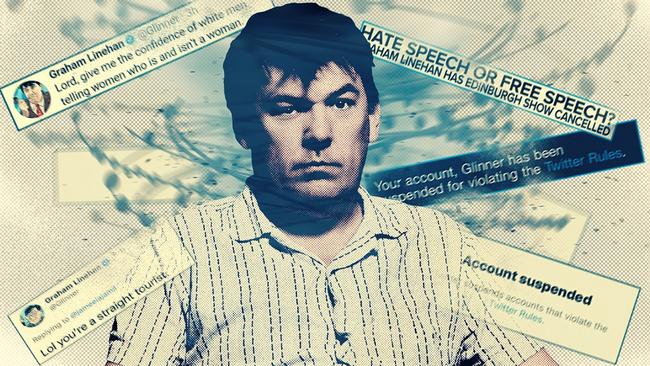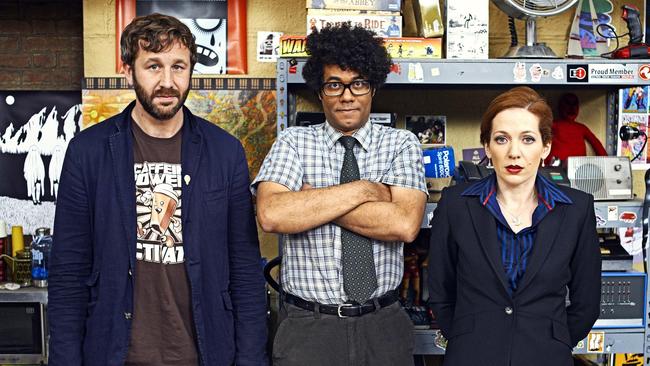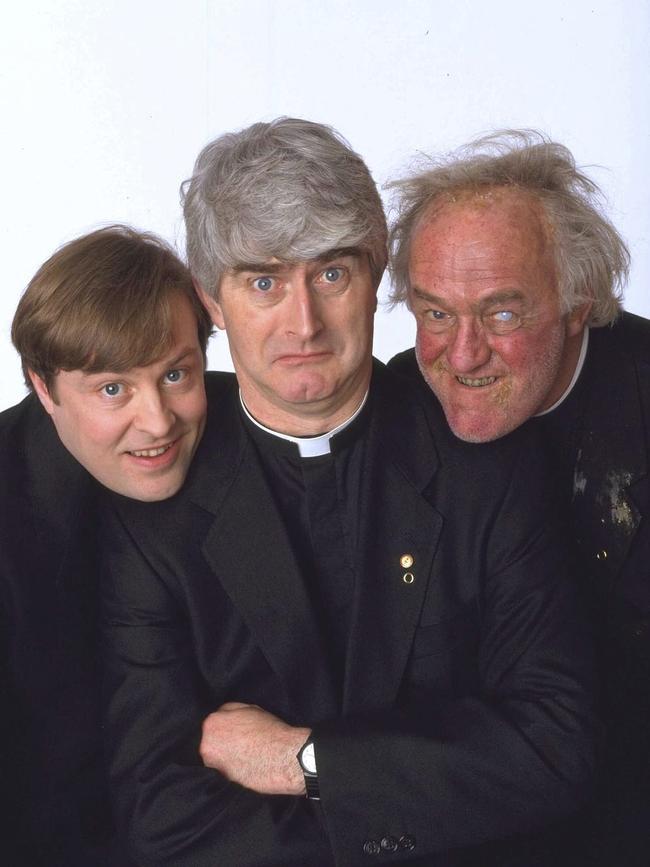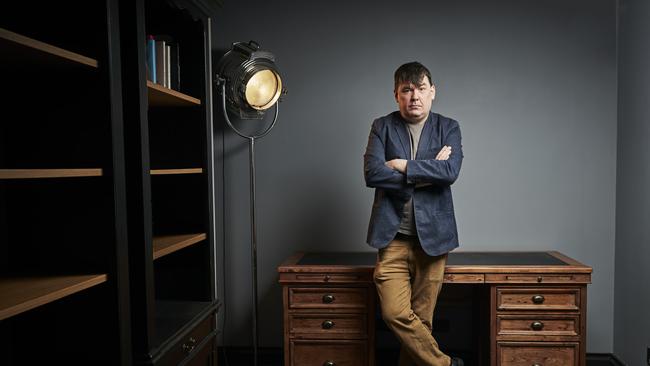The comedy genius who lost it all in the trans wars
The Father Ted writer Graham Linehan’s tweet about gender ideology launched him into an obsession that has cost him his career and family

It began with a message. It was the summer of 2018, I had been writing about gender ideology for four years and I noticed on my phone that I had received a message from Graham Linehan. Only two or three years earlier, I’d have been mystified as to why this god of comedy - the man behind Father Ted, for God’s sake - was contacting me. But in 2018 I knew why Linehan wanted to talk: he, too, had become interested in the rise of gender theory. This was the start of a long correspondence.
Prior to this, Linehan hadn’t exactly been combat-averse - he’d campaigned to repeal Ireland’s eighth amendment and decriminalise abortion - but he told me that he had stayed out of the gender debate thus far because he was wary of the “toxic fallout”. But then, bleary from morphine following an operation for testicular cancer, he unthinkingly tweeted to express his support for feminist campaigners who were being harassed by trans rights activists. And just like that, he blew up his life.
It seems incredible that this was only five years ago, so entrenched is Linehan’s reputation as a gender-critical campaigner, one who speaks, writes, blogs and tweets about trans ideology with relentless energy. And yet for much longer he was known as the king of British and Irish comedy, creator of beloved shows including Black Books, The IT Crowd and - most beloved of all - Father Ted. All three had a cleverness but also a warmth to them that feels very far from how many see Linehan now. He was never a luvvie, exactly, but he certainly knew everyone in British comedy, and everyone in British comedy wanted to work with him.

The period between the end of The IT Crowd in 2013 and Linehan’s entry into gender-critical activism gives a sense of how big he was: he co-wrote the first series of Channel 4’s Motherland, along with his wife, Helen Serafinowicz, and Sharon Horgan; he was also working on the BBC sitcom Count Arthur Strong; and he was planning a Father Ted musical.
All this and more is likely to be covered in Linehan’s upcoming memoir, Tough Crowd: How I Made and Lost a Career in Comedy. I expect it will be sharply written and very funny, serving as a reminder of what we’ve lost by Linehan’s shift from comedy to activism. Although it isn’t out yet, Tough Crowd is already the second most ordered book on Amazon.
So fast has this shift been, it’s easy to miss how astonishing it is: many have made a brand identity for themselves on Twitter, but Linehan, 55, is one of the very few who has lost an extremely well-established one - revered comedy writer - and gained an entirely new one. Even JK Rowling - no slouch in the gender-critical department - is still overwhelmingly known as a very successful author.
Now, Linehan is cancelled - an overused term, but accurate in his case. His marriage to Serafinowicz has collapsed, the Father Ted musical has been cancelled and his income is near to non-existent. At this summer’s Edinburgh Festival, two venues cancelled his shows because, one explained, Linehan’s belief that men and women can’t change sex, therefore trans women are not literally women, does not “align” with their values. With his usual determination, Linehan performed on the pavement in front of the Scottish parliament in Holyrood, and talked, sometimes tearfully, about the enormous criticism he has received.

But it’s not just his views that provoke criticism: aside from the gender activists who loathe him, many gender-critical feminists are uneasy about Linehan’s sometimes reckless activism. When the actor David Tennant wore a T-shirt expressing support for trans kids, Linehan described him in a tweet as a “groomer” - a term that implies paedophilia. He goes after feminist commentators if he feels they are insufficiently gender-critical, or if they criticise his blunt tactics, such as tweeting photos of trans women he finds on lesbian dating sites.
To those who have only followed Linehan’s career via the British press, the success of his memoir will probably come as a surprise, because they will have been under the impression that he is a total pariah. But Linehan has a large and deeply devoted following of, largely but not exclusively, women who feel that he is, via his blog, an invaluable source of information about the impact of gender ideology on children and women.
Some who once denounced him are now expressing support. In 2020, John Boyne, author of The Boy in the Striped Pyjamas, wrote an article in which he criticised Linehan for “masking [his] intolerance by promoting himself as a champion of women”. But this month, Boyne said to Linehan: “You were right, I was wrong.” Linehan’s book comes garlanded with endorsements from the likes of Jonathan Ross and the comedian and film director Richard Ayoade, dismaying many of the latter’s fans in particular.
This is a notable shift: such prominent figures publicly supporting Linehan would have been as unthinkable in 2020 as his currently cancelled status would have been in 2017. So will Linehan finally be vindicated?
When Linehan and I first started corresponding, I was feeling baffled by the rise of gender ideology. While so many people around me were taking it increasingly seriously, the more I looked into it, the more nonsensical it seemed: a woman, gender ideology argues, is not simply a biological fact, but a feeling.
This struck me as a toxic message to send young people (are we really telling teenagers that if they feel awkward, they’re probably born in the wrong body?), a retrograde one for gay people (so are lesbians now expected to have sex with males if they identify as trans women?) and an attack on women’s rights.

It is bleakly amusing to look back on my early articles: how tentative I was about trusting my own common sense. In a 2015 article headlined “Does feeling like a woman make you one? It’s OK to ask”, I gently suggest that because trans women athletes are bigger than female ones, this gives them an unfair advantage on the playing field - but then I rush back to blandness with the last line: “We are all just humans” (a conclusion beloved of anyone who doesn’t know what they think, or is too scared to say it).
So Linehan’s initial contributions to the argument felt edifying. He wasn’t nearly as confrontational as he is now, but seemed less hampered by self-doubt than me. Plus he wasn’t bound by my fears of becoming unemployed and broke - although, as it turned out, he would become both.
We sent each other articles we thought the other would be interested in, shared bafflement when the National Lottery handed over pounds 500,000 to the youth gender charity Mermaids, and generally offered each other friendly encouragement. He was funny, generous and kind, and it was nice to have someone to talk to about all this who was following it as closely as me but was outside journalism and feminism: surely if Graham Linehan - Graham Linehan! - could see how mad all this was, others could too?
Going back through our messages, I see we stopped corresponding in February 2020. This was a big month for Linehan. He appeared on Newsnight, describing his concerns about the Gender Identity Development Service (Gids), the only NHS gender ID clinic for young people in England and Wales. He said homophobic parents were transitioning their children at Gids because they would rather have a trans daughter than a gay son. He also compared the doctors he claimed were overseeing that transitioning to Nazis.
Linehan’s points about Gids have largely been borne out: the clinic is being shut down after an interim report by Dr Hilary Cass, published last year, expressed grave concerns about it, especially the overprescribing of puberty blockers - which help children change gender - to adolescents, often vulnerable, sometimes autistic, sometimes gay.
But Linehan’s Nazi comparison made my heart sink. Yes, trans rights activists often make similarly hyperbolic arguments, insisting anyone who questions gender ideology is making unhappy kids kill themselves. But you can’t say you’re the voice of reason and then chuck around Third Reich analogies. I understand better than most how annoying it is to be told to moderate your language when trans rights activists are calling you a murderer for not using someone’s chosen pronoun. But whenever I sank to their level, I felt as if I were losing myself. I didn’t deliberately stop communicating with Linehan then, but, in retrospect, I can see this is when our paths diverged.
Since then, Linehan has lived his life at a fevered pitch. Not long after Newsnight he was banned from Twitter for tweeting: “Men are not women.” In February 2021, he was criticised for joining a lesbian dating app to demonstrate the madness of “self-identification”, which is when a man can simply say he’s a woman and demand women’s rights. Around this time, Serafinowicz, his wife of 16 years, left him, because, Linehan said, she was scared of the threats the family were getting from trans rights campaigners (the couple have two children). She has never publicly commented on the separation.
And still he fights on. While many love Linehan and cheer him on, many others on what I’ll term “my side” view him with distaste. They see him as a monomaniacal bully who gives gender critics a bad name. Someone who has tipped into being a full-blown obsessive for whom gender just happens to be his obsession.
I see Linehan a little differently. I know how hard it is not to become obsessed with the madness of gender ideology. There have been times when I’ve been tempted to follow - to the exclusion of all else - which NHS trust had erased the words “women” and “vagina” from its paperwork so as not to insult trans women. But shortly after I started writing about gender, a friend said to me: “Make sure you have friends around you to tell you when you’ve gone too far. And make sure this is not all you think about.” And I do. Linehan, I suspect, does not.
Linehan, for all his obsessiveness, has been right about many things, but he had the misfortune of being right too early. I have lost a lot of things in this fight: work, some friends. But he’s lost everything: his reputation, his career, his family. I could never have put all that on the line. To some, it’s proof of his dedication to the cause; to others, it’s confirmation he’s lost his mind. I feel very sad for his family and I’m happy for him that his book is already doing so well. But the tragedy of Linehan is that no one - not his comedy fans, not his gender-critical supporters - would want to be him now.
The Times

To join the conversation, please log in. Don't have an account? Register
Join the conversation, you are commenting as Logout